This post is by Marc Howard of When You Live in the Now.
There was something distinctly different about the one-hundred and sixty or so aspiring coders that surrounded me last weekend at the We/Code event hosted at one of the most thriving coworking spaces in Barcelona–and it wasn’t just the free-flowing mojitos after a long day of learning to code.
Unlike many training events these people actually wanted to be there and stick it out all day long learning HTML and CSS, two web markup languages that are greek to most of us. This wasn’t your typical mandatory training event that your job or school requires you to attend rather this was a purely voluntary event, the first in Barcelona’s history.
In fact many of the attendees have never been to a coworking space–where mainly freelancers and other self-employed workers go to work and collaborate–let alone have ever learned new skills with random people from many different backgrounds, occupations and ages.
In case you didn’t get the memo, coworking is style of work that involves a shared working environment, often an office, and independent activity. Individuals are usually not employed by the same person.
This event was a glimpse into the future of work, where people of various backgrounds go where they are not tied to the traditional 9-5 kind of work, uninspired assignments and even a boss.
With Spain’s unemployment rate hovering between 22-26% the new generation of workers will not only need to get creative with seeking new job opportunities they will have to create their own opportunities–and without relying on an HR manager to decide their fate.
Many young Spaniards like Irene Giró Paradell, an aspiring coder recently out of college, despite being well-educated are still seeking work and see their future as being a bit blurry. When asked why she decided to come to the event to learn to code Irene puts this in plain language:
“I graduated last year with a BSc. in Nanoscience and Nanotechnology and took a year off to travel and explore new options for the future since I didn’t have a clue about what I wanted to do next. I’ve been interested in programming for a while now so I’m considering changing my career in that direction. I thought attending this event would be a good opportunity to learn more about front-end programming and would motivate me to keep teaching myself how to code.”
The We/Code event was presented by the coding bootcamp provider Iron Hack and was one of many regular events held at Makers of Barcelona (MOB), one of the largest and most bustling coworking spaces in Barcelona where a growing number of aspiring entrepreneurs, freelancers and digital nomads are coming every month to get work done, make connections and learn valuable digital skills.
Not all coworking spaces are created equal. “Many of the members continue to come here to be a part of the community that we have built and to be inspired by the many other independent workers” says Olga Permanyer, Chief of Operations for MOB. When asked about the diversity of the members Olga says “MOB is not only for independent workers–we actually have several small startups building companies out of here as well.”
The lure of working and collaborating in a coworking space can be similar to the buzz of a start-up environment and quite different from the uninspiring routine of the typical office cubicle. Although the “coworking generation” is at the forefront of the future of work according to Google Trends it’s still only the beginning with a growing number of people searching for the term “coworking”:

Google Trends – Web Search interest: “coworking” – Worldwide, 2004 – present
The Rise of the Coworking Economy
The coworking phenomenon is happening around world and is breeding a new kind of workforce that is spanning the 30-40-something “Generation X”, the 20-30 something “Generation Y” and the latest, the new borns-to-teens known as “Generation Z”.
In other words it’s no longer about age or location, it’s about the changing landscape of employment fueled by new remote working technology and the rise of a new generation of coworking spaces like MOB that is more than just a wi-fi connection and a seat. Interactive environments like MOB are where multi-disciplinary professionals in the fields of creativity, innovation and entrepreneurship share the same space and generate content.
According to MOB it’s about promoting the real-life experience of innovative ideas and coming up with new dynamics to implement them in a collaborative and always-learning atmosphere.
A growing amount of workers are now demanding an alternative to the typical corporate structure where intangible benefits like contributing to a community of like-minded people and being part of a meaningful purpose are the new priorities. This attracts a different kind of personality–one who is more open to the excitement that comes with creating your own work.
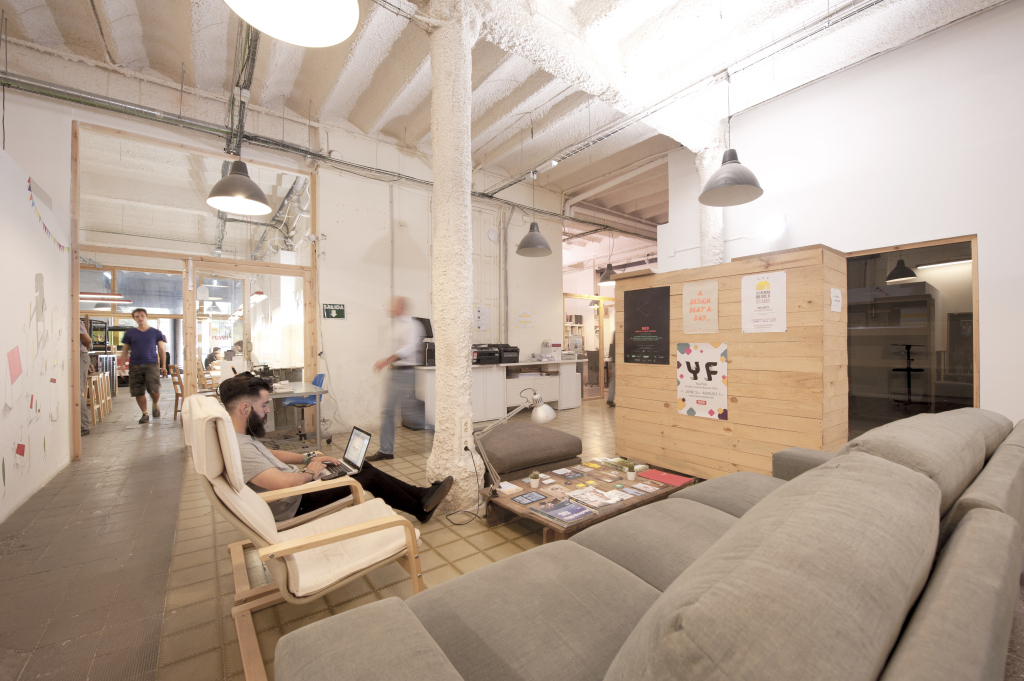
Photo credit: Makers of Barcelona
This phenomena is certainly not limited to Spain and in fact there are now hundreds of coworking office spaces globally and many more on the way. One of the most creative is one called CoBoat which is a 82ft. retrofitted, fully-wired catamaran where up to 20 digital nomads can travel around the world in “a sea-faring adventure combining life, work and play”.
Back across the ocean, in the United States the coworking movement is only at its infancy. According to a recent Intuit study “contingent” workers (including freelancers, self-employed, and contractors) will make up 40 percent of the US economy by 2020–which is approximately 60 million Americans.
A recent Harvard Business Review report discusses the benefits of getting employees to “collide”. According to their data, the idea is that creating collisions and chance encounters and unplanned interactions between knowledge workers, both inside and outside the organization—improves performance.
If you have ever been to a coworking space before you may have noticed this first hand. Unlike a typical office coworkers are generally individual entrepreneurs or freelancers from various backgrounds but when put together in a common space begin to form connections and relationships that otherwise may not have occurred.
For example if you are a programmer or graphic artist, connecting with a freelance digital marketer at the water-cooler could be the difference between a great product that the world will never hear about or a great product that gets in front of the eyes of thousands or millions of prospective customers.
If you are a bit too introverted for those chance encounters one of the other benefits of coworking is that many of these collaborative spaces provide regular workshops where you can learn anything from how to create a blog to social media marketing to digital design to entrepreneur fundamentals.
Instead of needing to find some random online course or outside expert like many companies do, you are on ground-zero among some of the most creative and entrepreneurial minds in an environment that sets you up for success.
Although there are tons of other ways to meet like-minded people and learn, being in an environment with people who you know, like and trust can make all the difference in the world.
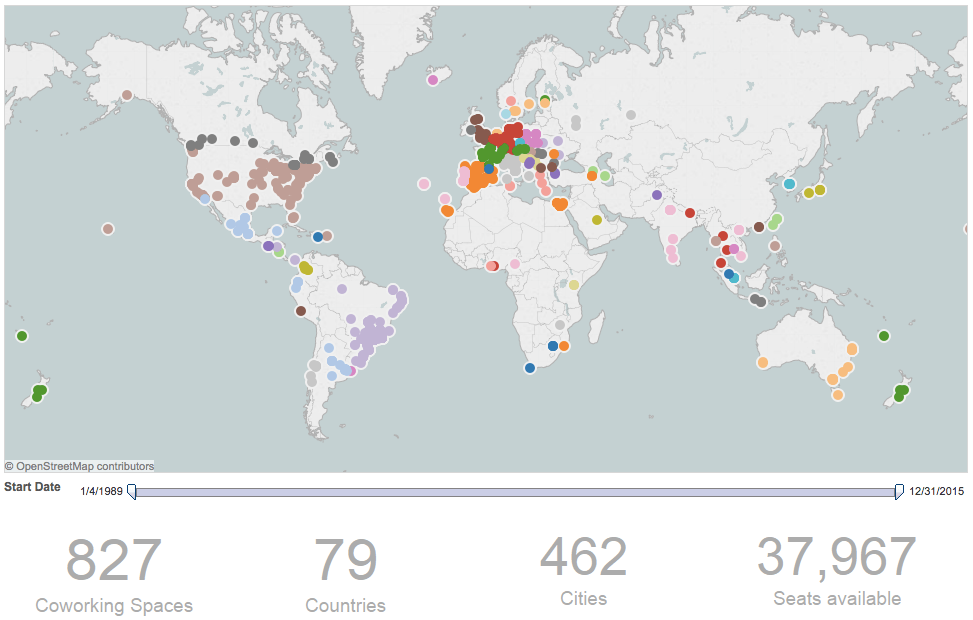
Map of coworking spaces around the world (Courtesy of coworkingmap.org)
Out of Sight, Out of Sync
If you are a remote worker/telecommuter or digital nomad it may be no surprise to learn that there is a strong negative correlation between the physical distance of your coworkers and your frequency of communication.
Known as the “Allen Curve”, from Thomas Allen’s ground-breaking 1977 book, Managing the Flow of Technology, the study estimates that we are four times as likely to communicate regularly with someone sitting six feet away from where we are as with someone 60 feet away.
The study still holds based on recent follow-up research by Ben Waber, where in one study engineers who shared a physical office were 20% more likely to stay in touch digitally than those who worked elsewhere. The study went on the report that co-located coworkers emailed each other four times as frequently as colleagues in different locations resulting in 32% faster project completion times.
This is all to say even though there are excellent distance-shrinking collaborative solutions like Slack and Asana and many others on the way, there is still no substitute for face-to-face and being in close proximity to like-minded individuals. Although there is no easy way to measure, this the ultimate success factor that the best coworking spaces in the world will be measured against.
How To Choose a Coworking Space
There is no easy answer on how to find and choose a coworking space since it really depends on what’s most important to you and your style of work. For example, some of the factors that many people use to choose are monthly cost, amenities, internet bandwidth, workshop availability, training seminars, networking events, printer access, weekend access, conference rooms, a mailing address, flexible plans, private keycode, etc.
How to Compare Coworking Cost
Cost will vary from city to city and according to what plan you choose (i.e. part-time/on-demand desk to full-time permanent workstation). When considering costs think about what coworking features and amenities are most important to you and sort out the necessities from the nice-to-haves.
In most major cities there are dozens of coworking facilities to chose from so you need to map out your work day and align it to those that meet your workings needs. For example, since I do everything from Skype video calls and Google Hangouts, to creating screen casts and trainings, and then save everything to the cloud, internet speed and reliability are critical to me as well as the occasional private meeting room to conduct calls/trainings.
Some aspects are hard to put a price on like run-ins with like-minded entrepreneurs which for me are priceless since I never know where the next amazing opportunity can come from. With that said you also need to keep in mind the intangibles or the coworking benefits that are hard to measure.
Examples of these can be work-life balance, inspiration, happiness, even human contact which is a growing pain point with many digital nomads and solopreneurs.
Getting To Know What Amenities Coworking Spaces Have
Amenities will range from the basics like free filtered water, tea and coffee to more upscale options like free breakfast or lunch that gives that thrilling startup feeling. Although the pricing will vary for what amenities you can expect most facilities have access to all the basics like printers, scanners/copiers, work desks, high-speed internet, meeting rooms and mailing addresses to accept your packages.
The Pros and Cons of Coworking and How To Decide If It Is Right For You
Like any new way of working you need to find what works best for your needs. There are many great benefits of coworking however there are also many concerns that you may wish to explore further before committing yourself. Coworking spaces that offer free trials or no commitments to try first is a great way to see if the concept is a good fit.
Having traveled to dozens of coworking spaces around the world here is just a shortlist of pros and cons that I have complied based on my personal experience as a digital nomad in no particular order.
Pros:
-Dedicated/business-grade high-speed internet access and other standard office amenities
-Daily opportunities to mingle and rub elbows with other freelancers and entrepreneurs
-Constant learning environment based on the variety of workers from diverse professions and backgrounds (i.e. graphic artists, bloggers, copywriters, writers/journalists, digital marketers, independent real-estate agents, startup founders, business consultants, social media managers, accountants, etc.)
-Very short “commute” time as many are in neighborhoods or at least easily accessible by public transport or bike in the city-center
-Ongoing free workshops that are live and in-person
-In-house networking events and happy hours
-English is spoken at many even in countries where English is not the primary language
-Various ages (contrary to popular belief coworking spaces are not all “a bunch of creative kids”–its typical to see anyone from students/recent grads to mid-age career consultants to retirees who happen to running their secondary income/lifestyle business from the internet)
Cons:
-Some costs can be confusing so you need to read the fine print before signing-up (i.e. sometimes there may be “add-on” charges for printing/copying or coffee)
-Lack of weekend availability or 24/7 private key-code access
-Language barriers (just because the owner may speak English doesn’t mean that the workshops or events are in English)
-Some can be rather quiet where networking, sessions and general interaction are not the priority (think public library but with coffee). Not necessarily a bad thing if you are there to work and not mingle but may be alienating to those just starting to strike out on their own.
-Can be initially lonely since you will basically be the “new guy” and workers can be quite transitory (for example a friend you meet one month may no longer be a member the following month)
Deciding If It’s For You
With that said, again my own personal opinion here based on experience at dozens of coworking spots around the world, I find that “good fits” for coworking tend to have the following profile:
-Ability to work independently and without close supervision
-Independent and self-sustaining types such as freelancers, consultants, early-stage start-ups, designers and most creatives
-People that enjoy what they do (this really goes for any kind of work environment but seems to be a bigger deal at coworking spaces since its hard to be productive or creative if you don’t like what you do compounded by the fact that you may not know anyone or have a structured work environment)
How to Work Successfully and Be Productive in a Coworking Space
Working from a coworking space does require a basic set of digital skills particularly if your work requires being online. Unlike a typical office environment it would be incorrect to assume that there is an “onboarding” process or digital skills orientation. Don’t go there to learn how to turn on your Mac.
While there are workshops and training at some of the better ones, you may find that some skills and productivity tools will, while not mandatory, go along way to boost your success and productivity.
The following is a list based on the best practices and toolkits of many fellow coworking friends and colleagues:
-Skype/Google Hangouts: these services allow free and inexpensive internet-based calling and video conferencing and screen sharing. Great for online meetings and presentations.
-Evernote: this is a note-taking web-based app that also syncs with your smart phone or tablet. Great for research notes, webclips/graphics, meeting notes and allows you to keep your individual notes grouped into larger notebooks.
-Workshops/Networking Events: Go to as many as you can as you never know where the next opportunity will come from. It never hurts to learn something new either–surprise yourself.
-Time Management: it’s easy to lose track of time and get off-course in an environment where there is no set lunchtime, no dress-code, no regular hours, and no boss behind you breathing down your neck. With that said self-discipline is probably going to be the most important soft-skill during your time at a coworking space. Having a to-do list or better yet using the Pomodoro technique will help you divide and conquer your time and tasks.
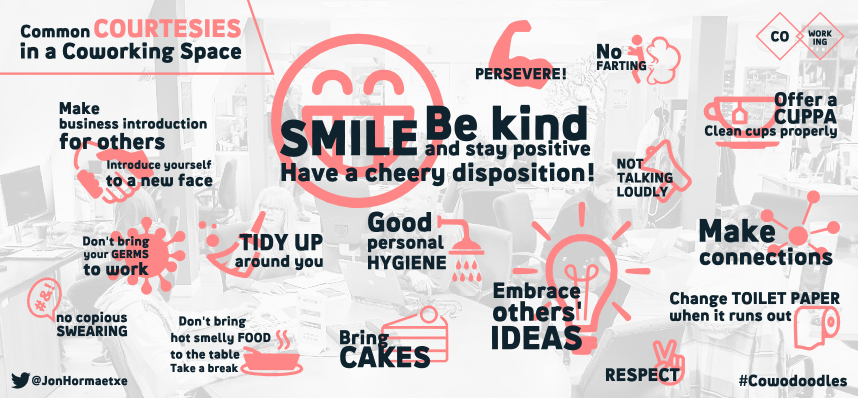
12 Questions to Ask Before Signing Up For a Coworking Space
Consider asking the following questions before you decide to become a member. All may not apply to your priorities however this is a good checklist to begin whether you are searching for a new facility or are at an existing one and want to make sure you are getting the best value for your money.
1. What are your plans and prices for part versus full-time coworking space?
2. What cost does this membership plan not include (i.e. locker space, coffee, training, after-hours access, reserved workspace, printing/scanning/copying, mailbox/concierge service, etc.)?
3. Do you publish a calendar of networking, training or workshop events?
4. Do you have any other locations and is the membership transferable (think your gym membership)?
5. Do you offer members any other community discounts such as reduced cafe pricing, gym membership or public transportation discounts?
6. Are you currently offering any promotions?
7. How do I cancel my membership (and do you prorate for the part of the month not used)?
8. Do you offer a free trial or reduced rate to try for a day or a week before I commit?
9. What is your internet speed (you’d be surprised by how many times the person you are speaking to either doesn’t know or those that are using a residental-grade service instead of a business-grade connection. 20Mb+ is usually a good start but it really depends on your location. For example 100MB would be a standard in Washington, DC while 10MB may be the “business-class” high-speed connection in Mexico City. For a quick check on average internet speed and best places to live and work remotely check outNomadList.)?
10. Can I bring my dog? (Perhaps this is only a question that dog lovers would understand–you would be surprised at how many are open to it versus those that have a strict no-dog policy. Just ask.)
11. How much conference room/meeting room time does my membership include every month?
12. Do you have a member-board where I can see what other members do and a way to contact them? For example if you need some coding help it would be great to first reach out to someone in the same coworking space–this can be a convenient alternative to having to find a freelancer on Upwork to help you.)
Helping People To Learn Is The Future of Coworking
Keep in mind that coworking is not all rosy and that it can easily turn into just another unstructured remote office or Starbucks where you go, struggle to get work done, and there is no one to help you when you need a hand especially if you are new to the game and just now striking out on your own.
Professional development is the often neglected side of coworking and an aspect that many members are becoming more and more concerned about as coworking spaces become larger and run the risk of losing the community feeling and alienating its members.
This presents a major challenge and one that many independent workers and entrepreneurs are all too familiar with. The challenge is how can an up-and-coming freelancer or one just starting a small business get access to not just the technology and location to get work done, but the business advice and coaching to excel at what you do? Surrounding yourself with successful people is just one part of the formula–interacting and learning from them is the other part of the success formula.
At the end of the day its not just about having a great product or service but being able to get that product or service in front of the right people. As many freelancers and entrepreneurs have a blog or website understanding digital marketing fundamentals will become a growing and more in-demand skill set.
The most accommodating coworking spaces will have on boarding sessions and trainings for these new digital skills such as social media marketing, customer development, content marketing, SEO and growth hacking.
The Essential List of Coworking Resources
If you’re still reading chances are you may want to continue discovering a bit more about the emerging world of coworking. Here is a short list of interesting coworking resources
- CoPass: 500+ unique coworking places around the world, one pass to access them all.
- Coworking Space Directory Find a coworking space near you.
- Coworking Visa – Review which spaces around the world that offer use to visiting from other participating spaces (normally just daily drop in).
- CoWorkHoliday: Curated list of the most amazing coworking spaces at vacation and resort locations around the world.
- Seats2Meet.com: Seats2meet is a platform for freelancers, independent professionals, and digital nomads to find each other as well as free places to cowork. New “knowmads” are asked to list their expertise so they can be matched up with those seeking help or partnership. The kicker is not only can you find free places to cowork, but also free help from other members.
- Chairify: Charify lets you share your own living room, kitchen table, spare desk or whatever comes to mind as a free coworking space.
- One Way Ticket: An in-progress documentary project by @Youjindo who’s releasing early footage now on YouTube as she interviews digital nomads and location-independent startups from around the world–the good, the bad and the crazy.
The TL;DR (Conclusion)
The workplace of the future is quickly changing and those that are the most successful will not only find new creative ways to work but also meaningful work in environments that allow easy collaboration with like-minded people.
Working from a coworking space as a freelancer or entrepreneur is not for everyone and requires a certain kind of personality, comfort with uncertainly and a healthy growth-mindset.
If you are one of the millions that are trapped in an office cubical the good news is coworking can be a break from the office and an opportunity to try something new. Sometimes the best advice comes from a good friend or coworker who has tried it before. Ask around–you never know where your next inspiration will come from.
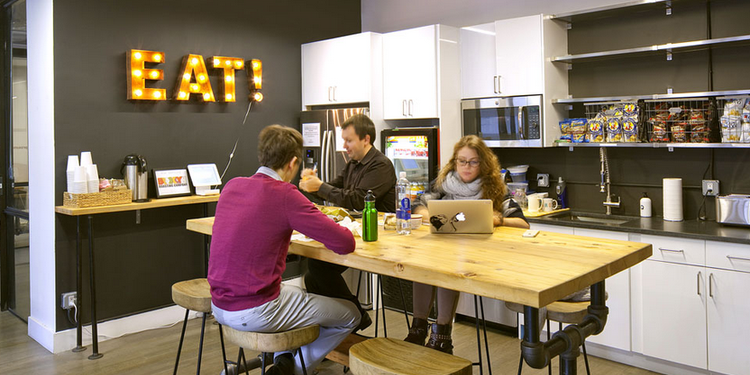




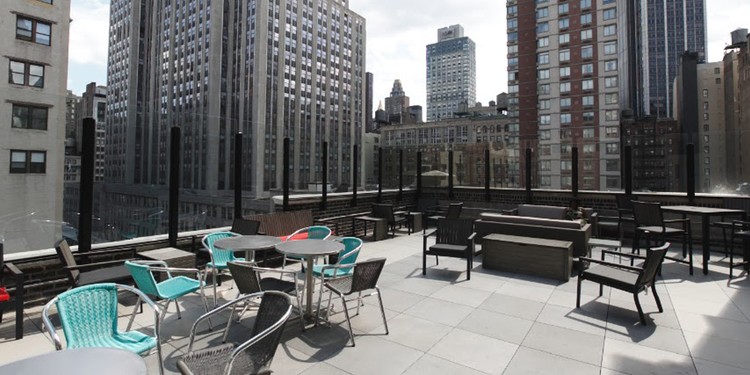


 Una curiosità: alcuni partecipanti sono passati con i loro figli, questo ci ha fatto non solo molto piacere ma ha contribuito a rendere più divertente l’atmosfera generale.
Una curiosità: alcuni partecipanti sono passati con i loro figli, questo ci ha fatto non solo molto piacere ma ha contribuito a rendere più divertente l’atmosfera generale.


